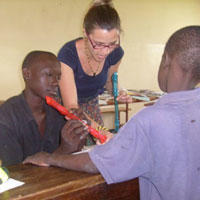David Philpott reflects on why international development charities should move away from images of malnourished children to demonstrating positive outcomes.
It was not perhaps the wisest thing to do, but since I only make time to read when reclining on a sun bed next a hotel pool, I decided I had better have a stab at reading professor Baron-Cohen's thought provoking little tome, Zero Degrees of Empathy. The fact that said Cambridge don is none other than Borat's cousin appealed to my mischievous nature but if truth be told, it was actually the exhortation of the senior partner of a law firm of good repute that had moved me to place my online order in the first place. "You simply must read this book David" he had said. "You will be able to spot people with Type P Personality Disorders a mile off" he had assured me.
Now it's true that I have long been fascinated by sociopaths in the workplace, those snakes in suits who climb their way to the top of the greasy pole and with Machiavellian ease, charm, exploit, bully and do whatever else it takes to win their own particular rat race - all it would appear - without a smidgen of empathy for those that get hurt along the way. But lying beside a pool on the Indian Ocean just hours after I had left the slums of Kampala in Uganda made me think a lot about what we used to call 'compassion fatigue' and what others might these days call 'empathy Deficit'.
I had just led one of my twice-yearly fact-finding trips to Uganda for Fields of Life - always with a dozen or so successful business leaders. The long weekend, starting with a flight out of Heathrow on Thursday night and concluding when the plane pulls up to the gate at Terminal 5 on Monday afternoon, is designed to give these mission tourists a packed three days on the ground, visiting schools, water bore holes and slum micro projects.
Everyone of these entrepreneurs is of course always transformed by these encounters with real people, deep in the heart of Africa - people who are benefiting from positive intervention programmes. All come back after their weekends in Africa with a commitment to do their part in making a difference, whether that be sponsoring a child through school at £17 a month or building an entire school for £70,000. Once they get there and see it, they get it. Getting them there in the first place is always an epic feat of gargantuan proportions. Why? Because they have seen African poverty for years either reported in television news reels or on Comic Relief nights and seemingly having become tired of the images and facts of poverty, have learned to suppress or in some cases turn off their empathy circuit.
Apparently I have a high empathy quotient (I have done the test). This means I find it hard to switch it off and am always imagining what it must feel like the be in their shoes (the person or cause eliciting empathy). I think what my fact finding trips to Africa have taught me that even the most right-wing, suspend-international-aid/the-money-never-gets-through/there's-too-much-corruption, objectors, are moved to do something when they see for themselves the permanent progress and enormous good International NGO's and faith groups are doing. Indeed, even Borat' himself might have his world view changed if he went and had a look.
Years ago I heard someone say that the difference between sympathy and empathy is that empathy is 'sympathy in action'. Three cheers then to all those charities that are now (rather belatedly in some cases) learning that it is not images of malnourished children with flies on their faces which will elicit such sympathy in action but by demonstrating positive outcomes and real success stories as people in the developing world are helped to help themselves.








